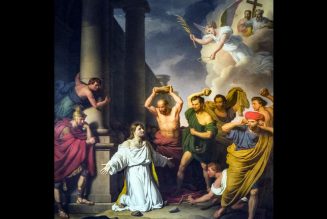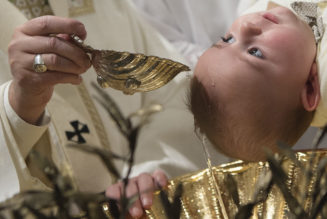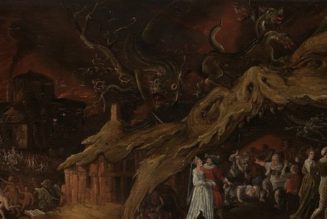
Opera has traditionally had little interest in Christian orthodoxy, except as a foil for some preferred spiritual excellence. The lyric stage has concerned itself mostly with the political life and especially with the erotic life, and left conventional godliness out of the picture. Of course Teutonic gods who go up in flames, quasi-karmic Fate, demonic religious personnel, and even some actual demons may have their appointed place, but old-fashioned Christianity is deemed out of order. So when the French Roman Catholic composer Francis Poulenc (1899–1963) wrote his 1957 masterpiece, Dialogues des Carmélites (Dialogues of the Carmelites), the work’s celebration of heroic piety defied the secular spirit of the art form.
Dialogues sings of the anguish and martyrdom of a small convent of nuns during the French Revolution; the officers of the new regime of terror order the sisters to renounce their vows and disband—or be killed. Georges Bernanos, best known for his novel Diary of a Country Priest, wrote the prose libretto, originally a screenplay, and then the script for a successful stage play. Poulenc’s great theme is courage, specifically the strength to cleave to the faith in the face of political upheaval that threatens to destroy everything—even the integrity of one’s soul.
The revolution’s terror state is the work of men who claim not to believe in something so deplorably unreal as evil spirits but who are nevertheless the agents of principalities and powers: When the revolutionary mob makes its entry in the opera, the wildly disordered music, unlike anything that came before, announces the new secular dispensation, which is actually the unholy Pandemonium. The nuns sing in harmony, but the revolutionary masses sing in frenzied discord. The clamor echoes in the individual voices of the revolutionary apparatchiks: the unctuous tenor of the First Commissioner; the hectoring bass of the Second Commissioner, who reads the expulsion decree; the suave baritone of the First Officer, who promises republican goodwill provided the nuns ordered to disband keep their noses clean—all issue from the original disorder of the murderous horde.
The political life is monstrous in this opera; frightfulness reigns, and constitutes a Hobbesian moral reality in which men are ruled by the fear of violent death and will do most anything to save their skins. The First Commissioner privately professes his sympathies for the victims of his official actions: To Mother Marie he intimates that he had been the sacristan of his parish church and that he loved the priest there, but now the times and his vengeful countrymen compel him to howl with the wolves. Sister Constance, an innately joyous young woman—a soubrette role that requires a voice of both spirited bite and angelic purity—reacts with contempt to the widespread cowardice that keeps good Frenchmen from defending the priests from persecution, and Sister Mathilde answers that fear has become universal, a contagion passed from one person to another, like plague or cholera.
The opera’s protagonist is Blanche de la Force, a marquis’s daughter who has chosen the religious name Sister Blanche of the Agony of Christ. For her, fear has always been a way of life. To her father’s chagrin, she informs him she is becoming a nun because ordinary secular life is just too much for her, an unbearable strain on her easily frayed nerves; alone in her room, she screams in terror at a footman’s shadow.
When the whole convent votes in a secret ballot to determine whether the nuns shall defy the mob’s order to renounce their vows and thus choose martyrdom, all the sisters vote “yes” for death—but a single “no” vote rejects the proposal for all. Though it seems likely that Blanche is the lone hold-out, Sister Constance, her closest friend, claims that the nay-saying was entirely her own, and she publicly changes her vote to yes, propelling the whole sisterhood to their earthly sacrifice and their eternal glory.
Sister Blanche bolts and hides out alone in the ransacked house of her father, who has just met his nobleman’s end on the guillotine. She resists Mother Marie’s entreaties to come join her sisters in their new gathering place, supposedly a safe one. In fact, it is the last stop before prison, where they are packed into one cell to await their execution. Courage means acknowledging one’s fear and rising above it, and in the final scene, the nuns singing hymns go bravely to their death one by one. The long legato lines of Salve Regina are punctuated but not interrupted by the thuds of the falling blade, until a solitary voice is left to intone the final lines of Veni Creator. Then that voice too is extinguished. The final nun to perish is Sister Blanche, who has arrived at the last minute to realize Sister Constance’s prophetic wish that the two friends die together.
The moral universe of Dialogues is notably opposed to that of the most famous French opera, Georges Bizet’s Carmen (1875)—whether Poulenc explicitly intended the contrast or not. Courage is the great theme of both, but where Poulenc presents the blessed fortitude of nuns willing to die for their faith, Bizet displays the hell-bent daring of characters who risk their lives—and some of whom lose their lives—in the service of the world, the flesh, and the devil: sexual heat, the crowd’s applause, or criminal greed. Here is an operatic world we are more familiar with: perfervid professions of love that are really something less than love, duty and honor and a nobler beloved all abandoned, and the ultimate murder of Carmen, who is as steadfast in her boldness in the face of death as she is volatile in her carnal desires.
Francis Poulenc felt the pull of the profane as well as the sacred, in his work as in his life. He wrote two other operas: Les Mamelles de Tirésias (Tiresias’s Teats, 1947), an opéra-bouffe or farce about the gender-fluid blind seer of Greek mythology, and La Voix Humaine (The Human Voice, 1959), the one-sided phone conversation of a woman cast off by her lover. In performances, the opera often ends with her suicide. Erotic misery was familiar territory to Poulenc, a gay man who was writing Dialogues while watching a lover die of cancer, and fearing he had cancer himself. His sexual temptations had long been a spiritual trial for him, for he was unable to renounce either his desire for men or his devotion to the Catholic Church. Dialogues des Carmélites presents, as eloquently as any modern work of art I know, the courage required to live and die in one’s faith, even though Poulenc knew himself incapable of such heroic will.
Algis Valiunas is a fellow of the Ethics and Public Policy Center.
First Things depends on its subscribers and supporters. Join the conversation and make a contribution today.
Click here to make a donation.
Click here to subscribe to First Things.








